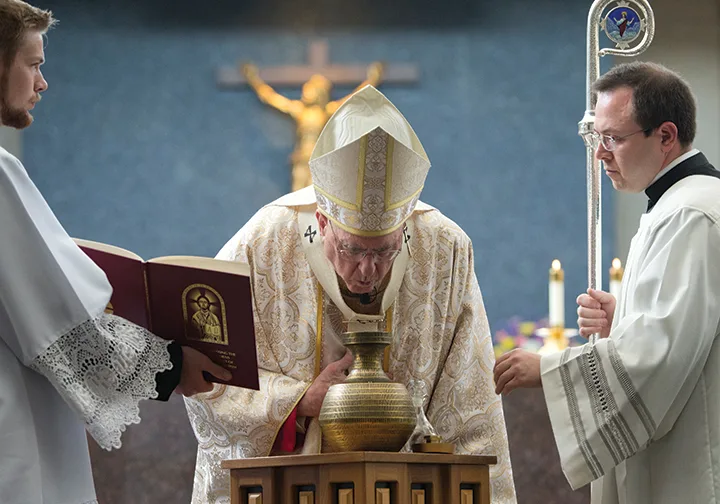
KANSAS CITY, Kan. — Something special happens during Holy Week that most Catholics have never seen.
But it plays an integral role in the sacramental life of all the faithful.
It’s the annual chrism Mass, so-called because it’s during this Mass that the bishop or archbishop consecrates the pure olive oil that becomes the holy oils that are used in administering the sacraments — and other things, too.
You may have seen a box or cabinet in your parish church where the holy oils are kept. It is called an ambry. If you look inside (they often have windows or clear glass sides), you will see the holy oils in three containers.
The first contains the sacred chrism. During the chrism Mass, a substance called balsam, a blend of aromatic oils and resin, is poured into this oil. Also, the bishop breathes over the oil. This symbolizes the Holy Spirit’s action in consecrating this oil. Chrism is used during baptisms, confirmations, ordinations and consecrations of altars and churches.
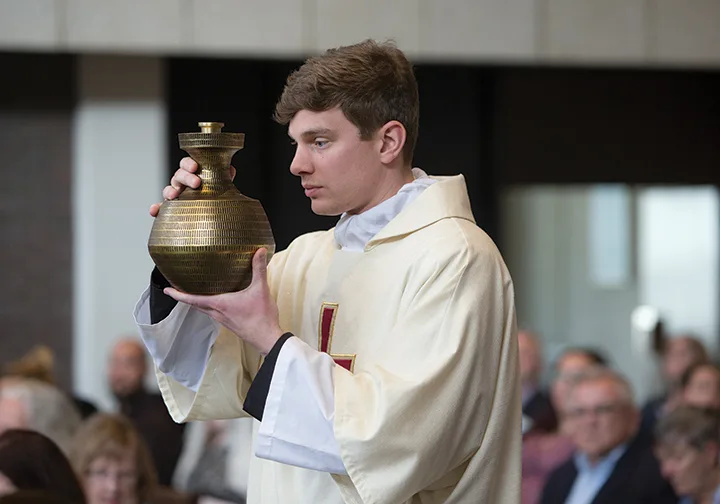
The second contains the oil of catechumens. It is used to anoint those who will enter the church by preparing them for baptism.
The third contains the oil of the sick. It is used for the sacrament of the anointing of the sick.
Olive trees and the oil derived from them are mentioned throughout the Bible. The oil had two uses — practical and spiritual.
For the practical, olive oil was used for cooking, fuel for lamps, cosmetics, a form of currency, soap and healing. An example of the latter is found in the Gospel of Luke, the parable of the good Samaritan (10:30-37). The Samaritan treated the robbery victim by pouring oil and wine on his wounds.
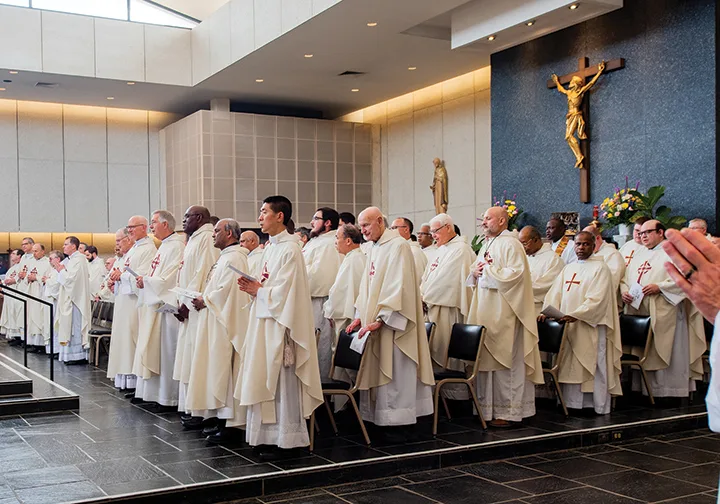
In terms of the spiritual, the significance of olive oil is quite profound.
For example, in the Book of Exodus, God commands Moses to make a holy oil, like the sacred chrism, to consecrate the tent of meeting, the Ark of the Covenant, the table, utensils, menorah, altars of incense and sacrifice, basins, and Aaron and his sons as priests (30:22-33). Oil offerings were part of Old Testament temple sacrifices and first fruits offerings.
In the psalms and other books of the Old Testament, olive oil signifies abundance, healing, blessing, joy, prosperity, fertility, peace, divine favor and eternal life.
Kings, priests and prophets were anointed with oil, such as when David was anointed by the prophet Samuel (1 Sm 16:13). The name “messiah” and “Christ” mean “the anointed one.”
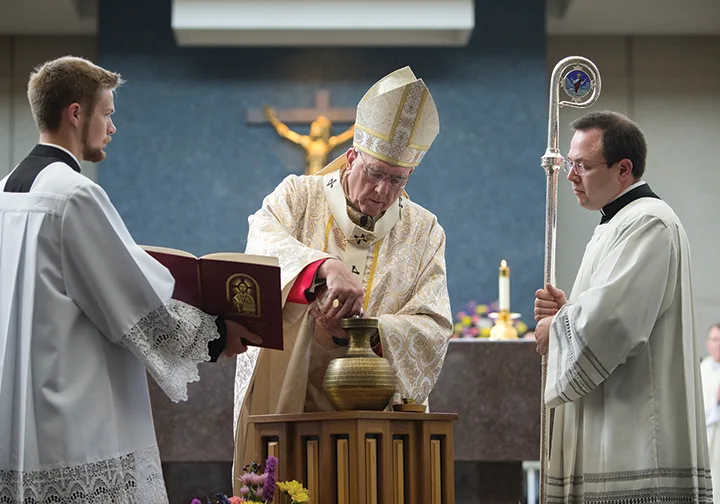
And the apostolic church continued to use oil. There are mentions of the use and blessing of oil for the sacraments throughout church history, such as the Apostolic Tradition of Hippolytus (written about 215 in Rome); St. Boniface in Germany about 730; and the Gelasian Sacramentary in Paris about 750.
“In the early church, the consecrated oil was considered a special sign of the presence of the Holy Spirit,” said Pope Benedict XVI in a Holy Thursday homily given in 2010.
In the Archdiocese of Kansas City in Kansas, the annual chrism Mass is usually held on the Tuesday morning of Holy Week instead of on Holy Thursday, since the distance some pastors have to travel to the Mass would make it difficult for them to get back to their parishes for the Holy Thursday evening liturgy.
Also, the chrism Mass is held at Savior Pastoral Center — not only for the same considerations of time and distance — but because of the facility’s ability to accommodate large groups. Lay representatives of different archdiocesan groups are also invited.
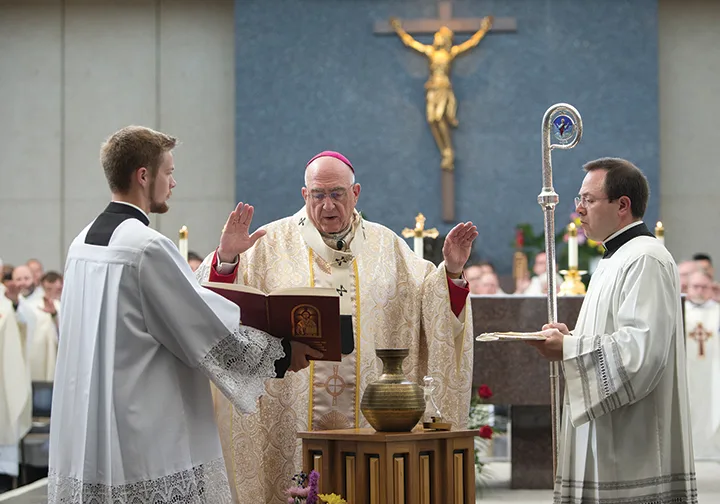
The chrism Mass is the annual opportunity for a bishop or archbishop to concelebrate the Eucharist with all of his priests, as an expression of the fullness of his priesthood and of the bonds of unity he and his priests share.
At that Mass, right after the celebrant’s homily, priests will also renew their vows. (See below.)
The blessing of the oils follows.
The oils are brought forward in a specific order: first comes the oil of catechumens, then the oil of the sick, and finally, the oil for the sacred chrism.
At the consecration of the final oil, the gathered priests also extend their right hands toward the sacred chrism, signifying their participation in the archbishop’s authority.
With the blessings concluded, the Mass resumes as it normally would with the preparation of the offerings.
When the Mass is over, each priest receives bottles of the three holy oils to take back with them to their parish. There is some latitude in determining the way the newly blessed oils are received at the parish — anything from a brief mention during the liturgy of Holy Thursday to a simple ceremony.
The old oils are disposed of by burning or burying them, according to the Book of Blessings.
The renewal of priestly promises
After the homily, the bishop addresses his priests in these or similar words.
Beloved sons, on the anniversary of that day when Christ Our Lord conferred his priesthood on his apostles and on us, are you resolved to renew in the presence of your bishop and God’s holy people, the promises you once made?
The priests, all together, respond: I am.
Are you resolved to be more united with the Lord Jesus and more closely conformed to him, denying your- selves and confirming those promises about sacred duties towards Christ’s church which, prompted by love of him, you willingly and joyfully pledged on the day of your priestly or- dination?
Priests: I am.
Are you resolved to be faithful stewards of the mysteries of God in the holy Eucharist and the other liturgical rites and to discharge faith- fully the sacred office of teaching, following Christ the head and shepherd, not seeking any gain, but moved only by zeal for souls?
Priests: I am.
Then, turning toward the people, the bishop continues:
As for you, dearest sons and daughters, pray for your priests, that the Lord may pour out his gifts abundantly upon them, and keep them faithful as minis- ters of Christ, the High Priest, so that they may lead you to him, who is the source of salvation.
People: Christ, hear us. Christ, graciously hear us.
And pray also for me, that I may be faithful to the apostolic office en- trusted to me in my low- liness and that in your midst, I may be made day by day a living and more perfect image of Christ, the priest, the good shepherd, the teacher and the servant of all.
People: Christ, hear us. Christ, graciously hear us.
May the Lord keep us all in his charity and lead all of us, shepherds and flock, to eternal life.
All: Amen.






